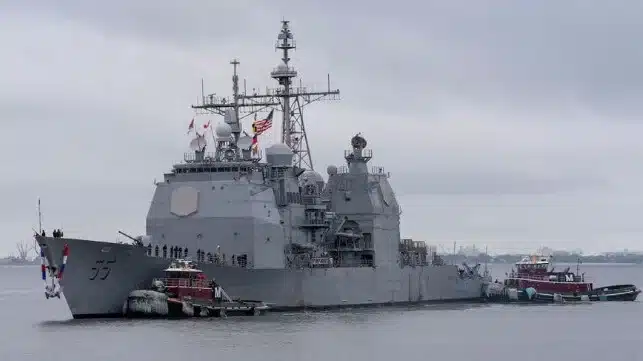USS Leyte Gulf Completes Last Deployment as Ticonderoga Class Nears End
Ticonderoga-class Cruiser USS Leyte Gulf Concludes 37-Year Service

On May 17, the venerable guided-missile cruiser USS Leyte Gulf concluded its final deployment, returning to Naval Station Norfolk after 37 years of distinguished service. The USS Leyte Gulf, along with her sister ships USS Antietam, USS Cowpens, and USS Vicksburg, is among the last of the Ticonderoga-class cruisers scheduled for decommissioning. These ships will transition to inactive status, serving as key sources for cannibalization and equipment removal.
Commissioned in September 1987, the USS Leyte Gulf was named in honor of the pivotal Battle of Leyte Gulf, a decisive 1944 engagement during World War II in which Allied forces overcame the Japanese navy. This battle played a crucial role in securing victory in the Pacific theater. The Leyte Gulf belongs to a class of 27 ships, most of which have already been retired. The final vessels of this class are slated for decommissioning by 2027.
“This ship is a living testament to naval history. Each era has seen its own adventures and generations of sailors at the helm,” remarked Capt. Nathan Diaz, commanding officer of the Leyte Gulf. “Our final deployment saw our crew etch their chapter into the story of this esteemed warship.”

During its extensive service, the USS Leyte Gulf amassed a diverse operational history, including anti-piracy missions off East Africa. Notably, in 2011, it participated in operations that captured 75 Somali pirates and supported missile strikes against the Libyan government. Earlier, the cruiser was involved in an at-sea collision with the aircraft carrier USS Theodore Roosevelt off the coast of North Carolina, incurring $2 million in damages.
The Leyte Gulf’s final deployment commenced on January 28, 2024. The ship ventured into the South Atlantic to conduct maritime interdiction and theater security operations within the U.S. 4th Fleet area. Collaborating with regional partners, the Leyte Gulf aimed to curb illicit drug trafficking. This last mission included the “Valkyries” of Helicopter Maritime Strike Squadron 50 and a U.S. Coast Guard Law Enforcement Detachment.
“The crew of Leyte Gulf exemplifies maritime cooperation,” said Vice Adm. Doug Perry, Commander, U.S. 2nd Fleet. “Their synergy with Navy air units and Coast Guard interdiction teams demonstrates our capability to project power and safeguard homeland security across multiple fleets. This final chapter for one of the Navy’s finest vessels is a proud moment for its crew.”
Throughout its final deployment, the Leyte Gulf executed maritime interdiction operations that disrupted 4,100 kilograms of cocaine. The crew detected and seized a self-propelled semi-submersible carrying 2,370 kilograms of narcotics, which was subsequently destroyed in a sinking exercise. The embarked Coast Guard team also commandeered three vessels and removed 15 drug traffickers from operations.
Originally designed with a 35-year lifespan, the Ticonderoga-class cruisers have seen extended service due to delays in their replacements. Arleigh Burke-class destroyers will temporarily fill their roles until the Navy’s next-generation destroyers are commissioned in the 2030s.
